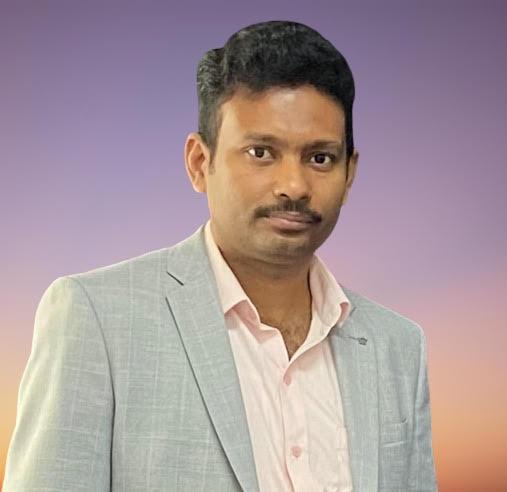Brojeshwar Bhowmick
Eminent Speaker
Short CV: Brojeshwar Bhowmick is a Principal Scientist and head of Visual Computing and Embodied AI research area at TCS Research. Over the past 20+ years, his research has focused on the intersection of computer vision, computer graphics, and AI to build interactive 3D digital representations of the physical world, which can be used to train embodied agents for reasoning, acting, and planning.
Brojeshwar Bhowmick is a Fellow of the IETE, a Senior Member of the IEEE, and an Associate Editor of the Springer SNCS journal. He has received the Best Paper Award at ICVGIP twice (2018 and 2021), the Best Demo Award at ICDCN 2020, third place in the global robotics rearrangement challenge in 2022, and the Patent Champion Award at TCS Research in 2016. He has published over 70 research papers and holds more than 50 granted patents. Two of his works have been featured by NDTV gadget 360 and TechXplore.
In recent years at TCS Research, he has developed many novel solutions, including one of the first adaptive and expressive talking head generation methods, 3D mapping for robot navigation (SLAM), 3D point cloud registration, object-based 3D mapping, a neural task planning method for a housekeeping robot, an intelligent telepresence robot and one of the first neural methods for virtual try-ons that can handle 3D loose garments with different fabrics and topologies. Currently he and his team is actively working on Spatial Computing where his aim is to build Spatial Intelligence algorithms and frameworks to support Always ON AI from XR glass data, 3D generative AI and next-gen human computer interfaces like aero-haptic, holograms etc.
Brojeshwar Bhowmick completed his doctoral studies at IIT Delhi, where his research on large-scale 3D reconstruction contributed to the digitization of Indian heritage sites. As a visiting scientist at the Graphics, Vision, and Video group at MPII in Germany, he worked on algorithms for 3D human digitization and 3D garment transfer. He earned his B.Tech in Computer Science from the University of Kalyani, West Bengal.
He has served as an organizing committee member of ICVGIP 2020 and 2021, the ICCV workshop in 2023, ISBI 2022, and the cognitive robotics workshop at RoMAN 2019. He has also served as a TPC member for conferences such as CVPR, ICLR, NeurIPS, AAAI, IJCAI, ICML, ECCV, and ICCV.
His research interests include 3D computer vision and graphics, large-scale 3D reconstruction, 3D human digitization, human-computer interaction, AR/VR, Embodied AI and deep reinforcement learning.
Title of Talk 1: Introduction to 3D reconstruction - past, present and future
Synopsis: 3D reconstruction is about recovering the 3D geometry from single and multi-view images. In the last few decades, a lot of research is being carried out to build algorithms which find relationships among multi-view images which ultimately reconstruct the scene in 3D. Recently, with the advent of deep learning, those algorithms are looked upon through the modern technological lens and new methods are getting developed to circumvent some of the limitations that earlier algorithms had. In this talk, we will discuss some of the fundamental multi-view geometry algorithms and navigate to the modern outlook of them with future promises.
Title of Talk 2: Towards Generalist Embodied Agents via Generative Simulator
Synopsis: Robot learning faces problems in generalization across task. Skills and environments. Though practicing in simulated environments is good, constructing these environments requires tremendous human effort, including designing tasks, producing semantically meaningful assets, generating plausible scene layouts etc. In this talk, we will discuss some of the recent works in home robot where such problems are faced and from there, we will extend the path towards generalist robot which can acquire new skills in new environment with new embodiment. Though we are very far from there, which is called foundational model for embodied AI, we will show some of the recent attempts towards that.
Title of Talk 3: Future of Spatial Computing
Synopsis: The integration of augmented reality (AR), virtual reality (VR), and mixed reality (MR) technologies is transforming human-computer interaction. Spatial computing enables seamless blending of physical and virtual worlds, promising to revolutionize various aspects of life. This technology leverages advancements in hardware innovations, AI capabilities, and sensor technologies to provide users with immersive and interactive experiences. With the potential to enhance human memory, anticipate future events, and aid industrial tasks, spatial computing is poised to transform industries and daily activities alike. This talk explores the current state and future directions of spatial computing, highlighting its transformative power in creating a more interactive and intelligent world.

Brojeshwar Bhowmick
Qualifications: Ph.D. Computer Science and Engineering
Title: Principal Scientist
Affiliation: Tata Consultancy Services(TCS) Research, Kolkata
Contact Details:
Email: [email protected]
LinkedIn: www.linkedin.com/in/brojeshwar
Twitter/X:
Facebook:
Instagram: